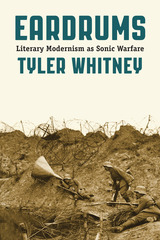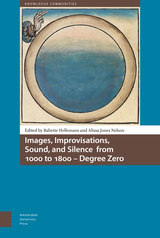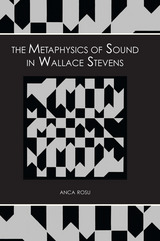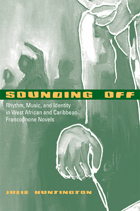5 books about Sound in literature

Eardrums
Literary Modernism as Sonic Warfare
Tyler Whitney
Northwestern University Press, 2019
In this innovative study, Tyler Whitney demonstrates how a transformation and militarization of the civilian soundscape in the late nineteenth and early twentieth centuries left indelible traces on the literature that defined the period. Both formally and thematically, the modernist aesthetics of Franz Kafka, Robert Musil, Detlev von Liliencron, and Peter Altenberg drew on this blurring of martial and civilian soundscapes in traumatic and performative repetitions of war. At the same time, Richard Huelsenbeck assaulted audiences in Zurich with his “sound poems,” which combined references to World War I, colonialism, and violent encounters in urban spaces with nonsensical utterances and linguistic detritus—all accompanied by the relentless beating of a drum on the stage of the Cabaret Voltaire.
Eardrums is the first book-length study to explore the relationship between acoustical modernity and German modernism, charting a literary and cultural history written in and around the eardrum. The result is not only a new way of understanding the sonic impulses behind key literary texts from the period. It also outlines an entirely new approach to the study of literature as as the interaction of text and sonic practice, voice and noise, which will be of interest to scholars across literary studies, media theory, sound studies, and the history of science.
Eardrums is the first book-length study to explore the relationship between acoustical modernity and German modernism, charting a literary and cultural history written in and around the eardrum. The result is not only a new way of understanding the sonic impulses behind key literary texts from the period. It also outlines an entirely new approach to the study of literature as as the interaction of text and sonic practice, voice and noise, which will be of interest to scholars across literary studies, media theory, sound studies, and the history of science.
[more]

Images, Improvisations, Sound, and Silence from 1000 to 1800 - Degree Zero
Edited by Babette Hellemans and Alissa Jones Nelson
Amsterdam University Press, 2018
The act of drawing a line or uttering a word is often seen as integral to the process of making art. This is especially obvious in music and the visual arts, but applies to literature, performance, and other arts as well. These collected essays, written by scholars from diverse fields, take a historical view of the richness of creation out of nothing (creatio ex nihilo) in order to draw out debates, sometimes implicit and sometimes formally stated, about the production and reproduction of cultural meaning in a period of great change and novelty, between the beginnings of the medieval intellectual tradition and the imprint of the Enlightenment. The authors pose the following questions: Do tradition and creativity conflict with one another, or are they complementary? What are the tensions between composition and live performance? What is the role of the audience in perceiving the object of art? Are such objects fixed or flexible? What about the status of the event? Is the event part of creation, in the sense that it disturbs the still waters of historical continuity? These and other questions build on the foundation of Roland Barthes' concept of Degree Zero, offering new insights into what it means to create.
[more]

The Metaphysics of Sound in Wallace Stevens
Anca Rosu
University of Alabama Press, 1995
Wallace Stevens dedicated his poetry to challenging traditional notions about reality, truth, knowledge, and the role of language as a means of representation. Rosu demonstrates that Stevens's experimentation with sound is not only essential to his poetics but also profoundly linked to the pragmatist ideas that informed his way of thinking about language. Her readings of Stevens's poems focus on revealing the dynamic through which meaning emerges in language patterns—a dynamic she calls "images of sound."
Rosu argues that the formal aspects of poetry are deeply ingrained in cultural realities and are, in fact, generated by their context. The sound pattern pervading Stevens's poems at once addresses and violates the reader's assumptions about the functioning of language and, along with them, ideas about reality, knowledge, and subjectivity. Sound is thus the starting point of an argument concerned with Stevens's epistemology and poetics—the way his poems insist on a movement past or through a normal poetic representation of the world to gesture toward a reality that lies outside or beyond systems of representation.
The relationship between sound and meaning isolated and analyzed in The Metaphysics of Sound in Wallace Stevens is firmly situated among critical debates concerning the poet's aesthetic and philosophical convictions. Rosu claims that Stevens's poetry is not ultimately about the powerlessness of language, nor is it a deconstructive enterprise of destabilizing culturally consecrated truths; rather it achieves meaning most frequently through patterns of sound. Sound helps Stevens make a deeply philosophical point in a language unavailable to philosophers.
[more]

Sound Rising from the Paper
Nineteenth-Century Martial Arts Fiction and the Chinese Acoustic Imagination
Paize Keulemans
Harvard University Press, 2014
Chinese martial arts novels from the late nineteenth century are filled with a host of suggestive sounds. Characters cuss and curse in colorful dialect accents, vendor calls ring out from bustling marketplaces, and martial arts action scenes come to life with the loud clash of swords and the sounds of bodies colliding. What is the purpose of these sounds, and what is their history? In Sound Rising from the Paper, Paize Keulemans answers these questions by critically reexamining the relationship between martial arts novels published in the final decades of the nineteenth century and earlier storyteller manuscripts. He finds that by incorporating, imitating, and sometimes inventing storyteller sounds, these novels turned the text from a silent object into a lively simulacrum of festival atmosphere, thereby transforming the solitary act of reading into the communal sharing of an oral performance. By focusing on the role sound played in late nineteenth-century martial arts fiction, Keulemans offers alternatives to the visual models that have dominated our approach to the study of print culture, the commercialization of textual production, and the construction of the modern reading subject.
[more]

Sounding Off
Rhythm, Music, and Identity in West African and Caribbean Francophone Novels
Julie Huntington
Temple University Press, 2009
Intrigued by "texted" sonorities—the rhythms, musics, ordinary noises, and sounds of language in narratives—Julie Huntington examines the soundscapes in contemporary Francophone novels such as Ousmane Sembene's God's Bits of Wood (Senegal), and Patrick Chamoiseau's Solibo Magnificent (Martinique). Through an ethnomusicological perspective, Huntington argues in Sounding Off that the range of sounds —footsteps, heartbeats, drumbeats—represented in West African and Caribbean works provides a rhythmic polyphony that creates spaces for configuring social and cultural identities.
Huntington’s analysis shows how these writers and others challenge the aesthetic and political conventions that privilege written texts over orality and invite readers-listeners to participate in critical dialogues—to sound off, as it were, in local and global communities.
Huntington’s analysis shows how these writers and others challenge the aesthetic and political conventions that privilege written texts over orality and invite readers-listeners to participate in critical dialogues—to sound off, as it were, in local and global communities.
[more]
READERS
Browse our collection.
PUBLISHERS
See BiblioVault's publisher services.
STUDENT SERVICES
Files for college accessibility offices.
UChicago Accessibility Resources
home | accessibility | search | about | contact us
BiblioVault ® 2001 - 2024
The University of Chicago Press









